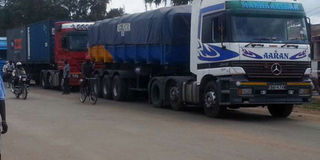Continental free trade pact raises several questions

Trucks at the Malaba border crossing in Busia County. Free movement of goods and services will be of benefit to many Africans. PHOTO | FILE | NATION MEDIA GROUP
What you need to know:
- The project will be great for a large section of Africa.
- Lawmakers may have to lay down some constitutional provisions to support the arrangement.
An event took place in Kigali, Rwanda on Wednesday, which I think is of significance in the way Kenyans will, from now on, perceive their belonging to the African continent.
Twenty-seven presidents - including our own - signed a treaty that establishes a free continental trade area, free movement of persons and right of residence anywhere within those countries.
CONSULTATIONS
I am given to understand that this is a result of a lot of work and consultations between the relevant government agencies across the board over some time.
The signing of this treaty left some questions on my mind.
One, what are the local constitutional implications of the agreement?
Which of the countries involved in the treaty have a better advantage over which ones?
RESOURCES
I truly hope and pray that this project works because it will be great for a large section of Africa and will place our continent where many international types – who pretend to be our friends because they want our resources – would not want us to be.
Among all those questions that linger in my mind, I figure that the most pertinent is the constitutional one.
I am not a lawyer or a lawmaker but from a layman’s position – as an interested Kenyan and African – my assumption is that in view of this treaty our lawmakers may have to lay down some constitutional provisions to support the arrangement.
SERENA TALKS
What constitutional considerations will those be in terms of our Kenyan context?
This takes my mind back to 2008.
We got into a major crisis after the 2007 elections. After the negotiations at Serena, an agreement was reached.
As a result, Parliament was mobilised to sit and craft an amendment that brought in the possibility of having a prime minister.
They tell us that where there is a will there is a way.
EXPERIMENT
We were able to enact our Constitution because there was a will in spite of the way the journey had been blocked for such a long time.
We got there anyway. Now we have experimented with it since the elections of 2013.
Are we happy with it? Devolution is probably the biggest gain in it. How well has it worked so far?
Of course the rationale for introducing devolution was that some areas were being favoured by the national government.
GOVERNORS
Where are we now with governors, members of county assembly and all the issues in the counties?
How about the council of governors versus the national government, and the National Assembly versus the Senate?
If we have to look at our Constitution again in order to accommodate the African treaty, we must also look at the local issues that this Constitution must be customised to address.
The writer is dean of students at the University of Nairobi. [email protected]





